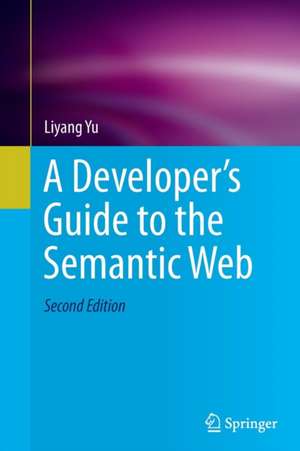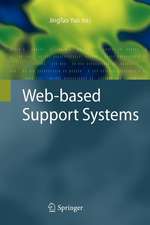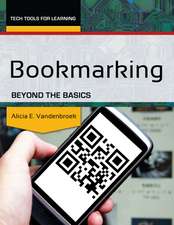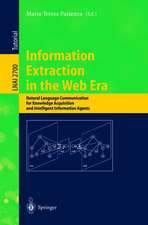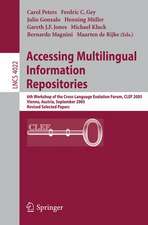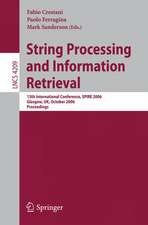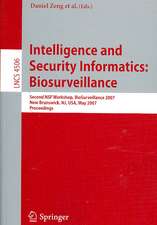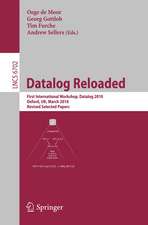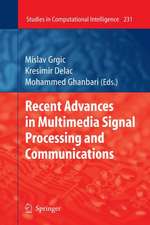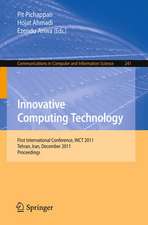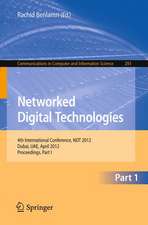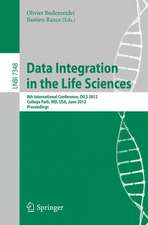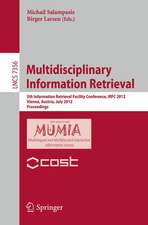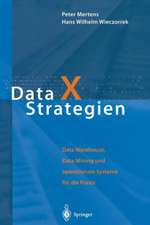A Developer’s Guide to the Semantic Web
Autor Liyang Yuen Limba Engleză Paperback – 24 sep 2016
A Developer’s Guide to the Semantic Web helps the reader to learn the core standards, key components and underlying concepts. It provides in-depth coverage of both the what-is and how-to aspects of the Semantic Web. From Yu’s presentation, the reader will obtain not only a solid understanding about the Semantic Web, but also learn how to combine all the pieces to build new applications on the Semantic Web.
The second edition of this book not only adds detailed coverage of the latest W3C standards such as SPARQL 1.1 and RDB2RDF, it also updates the readers by following recent developments. More specifically,it includes five new chapters on schema.org and semantic markup, on Semantic Web technologies used in social networks and on new applications and projects such as data.gov and Wikidata and it also provides a complete coding example of building a search engine that supports Rich Snippets.
Software developers in industry and students specializing in Web development or Semantic Web technologies will find in this book the most complete guide to this exciting field available today. Based on the step-by-step presentation of real-world projects, where the technologies and standards are applied, they will acquire the knowledge needed to design and implement state-of-the-art applications.
| Toate formatele și edițiile | Preț | Express |
|---|---|---|
| Paperback (1) | 438.47 lei 38-44 zile | |
| Springer Berlin, Heidelberg – 24 sep 2016 | 438.47 lei 38-44 zile | |
| Hardback (1) | 1080.47 lei 6-8 săpt. | |
| Springer Berlin, Heidelberg – 11 dec 2014 | 1080.47 lei 6-8 săpt. |
Preț: 438.47 lei
Preț vechi: 548.09 lei
-20% Nou
Puncte Express: 658
Preț estimativ în valută:
83.91€ • 87.28$ • 69.27£
83.91€ • 87.28$ • 69.27£
Carte tipărită la comandă
Livrare economică 10-16 aprilie
Preluare comenzi: 021 569.72.76
Specificații
ISBN-13: 9783662506523
ISBN-10: 3662506521
Ilustrații: XXV, 829 p. 624 illus. in color.
Dimensiuni: 155 x 235 mm
Greutate: 1.18 kg
Ediția:Softcover reprint of the original 2nd ed. 2014
Editura: Springer Berlin, Heidelberg
Colecția Springer
Locul publicării:Berlin, Heidelberg, Germany
ISBN-10: 3662506521
Ilustrații: XXV, 829 p. 624 illus. in color.
Dimensiuni: 155 x 235 mm
Greutate: 1.18 kg
Ediția:Softcover reprint of the original 2nd ed. 2014
Editura: Springer Berlin, Heidelberg
Colecția Springer
Locul publicării:Berlin, Heidelberg, Germany
Cuprins
1 A Web of Data: Towards the Idea of the Semantic Web.- 2 The Building Block for the Semantic Web: RDF.- 3 Other RDF-related Technologies: Microformats, RDFa and GRDDL.- 4 RDFS and Ontology.- 5 OWL: Web Ontology Language.- 6 SPARQL: Querying the Semantic Web.- 7 FOAF: Friend of A Friend.- 8 DBpedia.- 9 Linked Open Data.- 10 Schema.org and Semantic Markup.- 11 Social Network and the Semantic Web.- 12 Other Recent Applications: Data.gov and Wikidata.- 13 Getting Started: Change Your Data into Structured Data.- 14 Building the Foundation for Development on the Semantic Web.- 15 Example: Using Jena For Development on the Semantic Web.- 16 Follow Your Nose: A Basic Semantic Web Agent.- 17 A Search Engine that Supports Rich Snippets.- 18 More Application Examples on the Semantic Web.
Notă biografică
Liyang Yu is Senior Software Developer with Delta Air Lines in Atlanta, GA, USA. His previously published Semantic Web books are widely used as textbooks and often referenced by developers worldwide. He also actively provides services and assistance to a variety of organizations and companies about development and applications of Semantic Web technologies.
Textul de pe ultima copertă
The Semantic Web represents a vision for how to make the huge amount of information on the Web automatically processable by machines on a large scale. For this purpose, a whole suite of standards, technologies and related tools have been specified and developed over the last couple of years, and they have now become the foundation for numerous new applications.
A Developer’s Guide to the Semantic Web helps the reader to learn the core standards, key components, and underlying concepts. It provides in-depth coverage of both the what-is and how-to aspects of the Semantic Web. From Yu’s presentation, the reader will obtain not only a solid understanding about the Semantic Web, but also learn how to combine all the pieces to build new applications on the Semantic Web.
The second edition of this book not only adds detailed coverage of the latest W3C standards such as SPARQL 1.1 and RDB2RDF, it also updates the readers by following recent developments. More specifically, it includes five new chapters on schema.org and semantic markup, on Semantic Web technologies used in social networks, and on new applications and projects such as data.gov and Wikidata, and it also provides a complete coding example of building a search engine that supports Rich Snippets.
Software developers in industry and students specializing in Web development or Semantic Web technologies will find in this book the most complete guide to this exciting field available today. Based on the step-by-step presentation of real-world projects, where the technologies and standards are applied, they will acquire the knowledge needed to design and implement state-of-the-art applications.
A Developer’s Guide to the Semantic Web helps the reader to learn the core standards, key components, and underlying concepts. It provides in-depth coverage of both the what-is and how-to aspects of the Semantic Web. From Yu’s presentation, the reader will obtain not only a solid understanding about the Semantic Web, but also learn how to combine all the pieces to build new applications on the Semantic Web.
The second edition of this book not only adds detailed coverage of the latest W3C standards such as SPARQL 1.1 and RDB2RDF, it also updates the readers by following recent developments. More specifically, it includes five new chapters on schema.org and semantic markup, on Semantic Web technologies used in social networks, and on new applications and projects such as data.gov and Wikidata, and it also provides a complete coding example of building a search engine that supports Rich Snippets.
Software developers in industry and students specializing in Web development or Semantic Web technologies will find in this book the most complete guide to this exciting field available today. Based on the step-by-step presentation of real-world projects, where the technologies and standards are applied, they will acquire the knowledge needed to design and implement state-of-the-art applications.
Caracteristici
Offers complete coverage of all core standards and technical components of the Semantic Web, including RDF, RDFS, OWL 1 and 2, SPARQL 1.1 and RDB2RDF and related technologies such as Turtle, Microformats, RDFa, GRDDL and SKOS Provides an in-depth description of many well-known applications and projects such as FOAF, DBpedia, Linked Open Data, schema.org by Google, Yahoo! and Bing, Rich Snippets by Google, various Semantic Web applications in social network sites, data.gov and Wikidata Project Explains the key concepts, core standards and technical components in real-world examples, guiding the readers step-by-step through the development process to bridge the gap between what-is and how-to Includes source code for the examples and application projects, ready for download from the author’s website, www.liyangyu.com Includes supplementary material: sn.pub/extras
